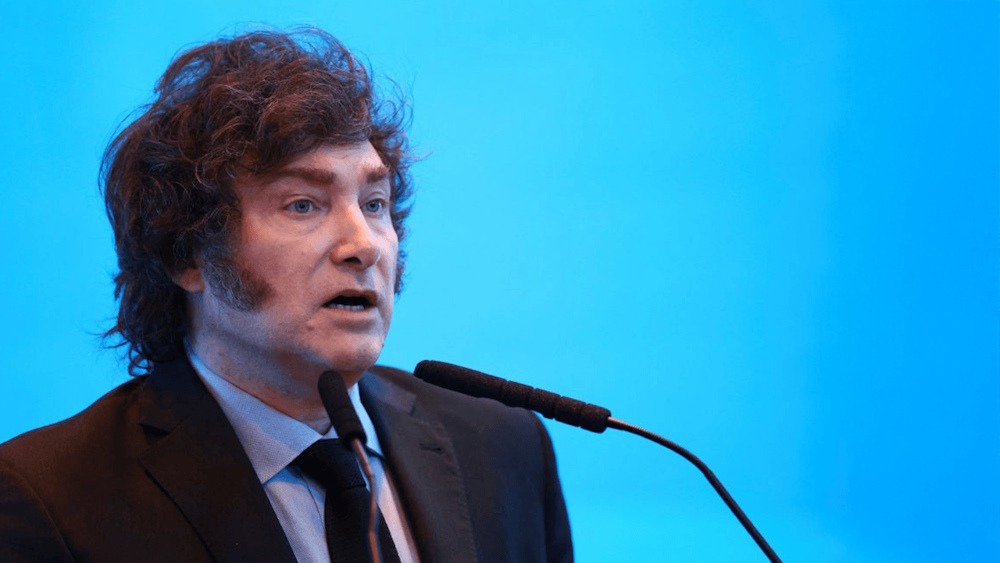President threats budget offenders with jail, accuses adversaries of “genocide” and suggests court fight over laws passed after congressional defeats. Javier Milei conducted his seventh nationwide broadcast since assuming office on Friday, utilizing the opportunity to rationalize a series of vetoes that were published in the Official Gazette earlier in the week under Decree 534/25.
As the pivotal midterm elections approach, the vetoes may prove detrimental to the libertarian administration. The measures impede a 7.2 percent rise in pensions, the announcement of a disability emergency, and the prolongation of the pension moratorium. The President reiterated his strong criticisms of Congress and the broader political system in response.
Milei was accompanied by Economy Minister Luis ‘Toto’ Caputo, Deputy Economy Minister José Luis Daza, Central Bank (BCRA) Governor Santiago Bausili, and BCRA Vice-President Vladimir Werning during his address. The backdrop, presented from the Salón Blanco of the Casa Rosada, highlighted the economic significance of the message as the election campaign in Buenos Aires Province commences. Provincial elections are scheduled for September 7, preceding the national legislative election on October 26.
Milei, aiming to reclaim the political initiative, unveiled two measures on Friday that he acknowledged primarily formalise existing practices: a prohibition on the Central Bank transferring funds to the Treasury and a legislative proposal to impose criminal penalties on officials who prepare budgets reflecting a fiscal deficit. The proposals represent a strategic effort to confront the opposition, which presently holds sway over the legislative agenda in both chambers.
The President’s speech reiterated themes he has expressed numerous times before, primarily concentrating on the need to balance the public accounts. In a notable intensification of tensions, he charged opposition lawmakers with perpetrating “genocide” through the passage of legislation that incurs fiscal liabilities – a narrative consistent with La Libertad Avanza’s campaign approach in Buenos Aires Province, in conjunction with its new PRO allies, who have adopted the slogan “Kirchnerismo nunca más,” intentionally resonating with the atrocities of the 1976-1983 military dictatorship.
Milei reiterated his electoral message, asserting that the government assumed power with a “clear mandate” to “eliminate inflation … without shortcuts or gradualism.” He asserted that his administration has diminished both poverty and extreme poverty, further stating that it is poised to eliminate inflation by the middle of next year. He also criticized “a lamentable spectacle in Argentine politics” during recent congressional sessions, without referencing the lower house Chamber of Deputies or his estranged Vice-President Victoria Villarruel, who presides over the Senate.
“My job is not to seem nice, even if they say I am cruel,” Milei declared. “To Congress I assert: if a return is desired, you will need to remove me in a manner that suggests finality.” The absence of any expression of empathy for those impacted by the vetoed laws – including pensioners, individuals with disabilities, and their families – is notable, particularly as some faced police repression during demonstrations outside Congress earlier this week. Friday’s nationwide broadcast represented an effort by Milei to regain control of the agenda, which has been diminished since the emergence of the cryptocurrency scandal on February 14.
Milei explicitly connected the moment to the elections on October 26, calling on voters to reshape the congressional landscape to “end the paradox” and indicating his strategy to polarise against Kirchnerism in order to eliminate centrist options. “There is no third way at the crossroads,” he declared. Milei, in justifying his vetoes, criticized the Senate’s final ordinary session on July 10, which was convened by the opposition and resulted in the approval of pension and disability legislation. “The legislative process followed for the approval of these projects is tainted by serious nullities that prevent the Executive Branch from proceeding with their enactment,” states Decree 534/25.
The government contends that the session was convened inappropriately and that the committee’s rulings lack validity, necessitating a qualified majority instead of a simple majority for floor debate. The decree references a Supreme Court case concerning the National State and the Province of San Juan, specifically addressing the Executive’s veto powers as delineated in Article 83 of the Constitution. Milei indicated that he is still contemplating a legal challenge, although existing precedent provides him with limited flexibility.

